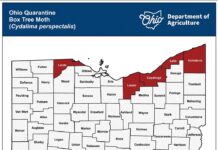SALEM, Ohio –The battle over corn continues to intensify as the nation prepares for a yield reduction and near-record prices of more than $8 per bushel.
The U.S. Department of Agriculture’s crop production report, released Aug. 10, predicts a 13 percent yield reduction in corn over last year, and a 12 percent reduction in soybeans.
Tighter supplies and higher prices have led livestock farmers and the groups that represent them, to call for a waiver or partial waiver of the U.S. Environmental Protection Agency’s Renewable Fuel Standard.
The RFS is a policy that requires fuel producers to blend a minimum of 13.2 billion gallons of ethanol into gasoline this year, or about 10 percent of total gasoline usage. Next year, it increases to 13.8 billion gallons. That translates to about 40 percent of the U.S. corn crop.
Crop farmers
On the other side, major crop organizations like the National Corn Growers Association, say it’s too soon for a waiver and maintain that such action would not significantly decrease the price of corn.
The two camps are not exclusive, and there are many producers in the middle, but there is a noticeable difference of opinion between livestock and grain farmers.
Livestock producers are already suffering because of poor pasture conditions and high hay costs as a result of the historic drought, said Ohio State University Ag Economist Matt Roberts. Lower yields will mean higher feed costs and the potential that more of them will be forced to sell their herds because they can’t afford to feed them.
“There is more and more pressure for the ethanol mandate to be reduced for the current year to increase the availability of corn for livestock feeding,” Roberts said in a released statement.
Increased interest
The calls began as a plea for a temporary waiver, but have increased in volume and in the amount to be waived.
Some 25 U.S. Senators sent a letter Aug. 7 to the Environmental Protection Agency urging the agency to use its existing waiver authority to adjust the country’s ethanol mandate because of the negative impact on corn prices caused by the drought, which is the country’s most severe in 56 years.
The National Pork Producers Council is among the supporters of a waiver, citing an Indiana study that showed commodity prices are directly linked to ethanol, and are partly to blame for higher fuel costs.
“The increases we’ve seen in commodity prices are strongly associated with the RFS mandate,” said Thomas Elam, president of FarmEcon LLC, the study’s author. “At the same time, we haven’t seen the promised benefits on oil imports or gasoline prices. This means that while Americans are forced to pay more for food, they’re also not seeing lower prices at the pump; it’s a lose-lose situation.”
Free market
If ethanol is truly a viable industry, it should be required to support itself without a mandate, said Geauga County dairy producer Brenda Hastings.
“If it is a good business model and a wanted product, then it should stand alone,” she said. “I want grain farmers to be profitable and successful as well, but I think the real unintended consequence of the ethanol policy is the great financial strain it puts on livestock producers in this country.”
Hastings said feed prices “have exploded” since the ethanol mandate was enacted. The farm currently pays about $600 a ton of soybean meal, compared to just $200 a ton five or six years ago.
Those are soybeans — not corn — but Hastings said all feed sources are affected because the ethanol mandate causes farmers to plant more acres to corn and leave fewer for soybeans and hay — driving up the prices of other crops, as well.
Hastings and her husband, Lad, grow about half their feed needs and buy the rest.
RFS support
The National Corn Growers Association stands behind the RFS, and says altering it is premature.
“(NCGA) will strongly oppose legislation to alter or repeal the RFS,” said NCGA President Gary Niemeyer, in a statement to media. “Likewise, we believe it is premature for a waiver of the RFS provisions at this point. With the crop still in the field, it is too early to determine this year’s final corn supply. In addition, the ethanol industry now has a significant surplus of ethanol and RFS credits that can greatly offset ethanol’s impact on the corn supply.”
Niemeyer said NCGA understands the stress the drought has caused, and supports the waiver process found within in the current RFS, and respects the right of those who may file a petition for such waiver.
Looking ahead
It’s unclear if or when EPA may enact a waiver. But without one, livestock producers could see long-term effects.
“Ethanol plants that shut down or go bankrupt if the waiver is approved will still exist and can easily return to production when prices return,” Roberts said. “But with cattle, it takes 2 to 4 years to build up a cattle herd.
“So if these high feed prices cause cattle herds to decline, then in the best-case scenario, it will take multiple years to rebuild those herds.”
As a result, the livestock industry is asking for an ethanol standard waiver, in any amount, he said.
“Any waiver would help livestock through lowered feed prices, so from the livestock industry perspective, the bigger the waiver, the better,” Roberts said.










Gee, here’s a tough one. You have a high-input crop that is an essential ingredient for so much of America’s food supply, from livestock feed to sweetener and a million things in between. Then you take 40% of this crop out of the food supply for the purpose of distilling it into a fuel that is less efficient than gasoline, exponentially more costly, and damaging to many older vehicles. The energy input-to-output ratio of using corn for ethanol fuel is ridiculously close, then of course it must be subsidized with our tax dollars to be kept affordable. Can anyone explain to me how this could possibly be a good idea? Who is going to subsidize the consumer when EVERYTHING in the grocery store is more expensive due to tight supplies? Leave it to special interest and the USDA to come up with an idea this stupid and use our tax $$ to finance it. I agree with Ms. Hastings in the article. Lets cut ALL corn ethanol subsidies and mandates and see if this product can stand on its own.
Gee, this is tough one. You have a high-input crop which comprises a large portion of America’s food system and you take 40% of this highly valuable food crop to produce a fuel which has less energy in it than gasoline and can even cause damage to engines not designed for it. Oh, and the fuel takes nearly as much energy to produce it as it yields and the government needs to subsidize it to make it competitive on the free market. So…can someone please explain to me why anyone thinks this is a novel idea? With corn in short supply and rising prices pushing EVERYTHING higher in the grocery store, who will subsidize the consumer? Will there be enough subsidies to keep corn affordable for feedlots? Hog producers? Dairy farmers? I think we know the answer to this question. Leave it to the government and Ag special interest to create and perpetuate a problem like this. I agree with Ms. Hastings in the article, cut ALL subsidies and ridiculous mandates and let corn ethanol fail on the free market.
We need the corn for our livestock and humans to eat,stop putting it into fuel!
I saw a deal other day where they are talking about useing cow patty’s for fuel like they did way back when,,so give the corn to the cattle and use thier wast for fuel,,problem solved..